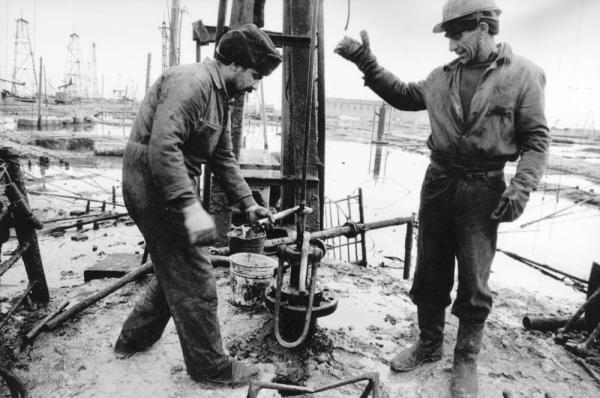Letter from Baku, Azerbaijan
On the farthest eastern reaches of Europe lies the Caspian Sea, a milky green land-locked sea that hides many treasures.
It is famous for its sturgeon and the sea is the world's main source of caviar. The sea also sits upon vast reserves of oil and gas worth trillions of dollars.
The wealth of the Caspian Sea basin, perhaps the last great untapped source of energy on the planet, will make it of vital strategic importance in decades to come and crucial to European prosperity in the next millennium.
It already has drawn Western companies and governments to invest billions of dollars in the region. The Caspian is where oil was first discovered. It literally bubbled straight out of the earth. Natural gas that escaped through fissures in the rocky ground gave birth to one of the world's oldest religions, Zorastrians fire worshipers, who built a temple around a perpetual fire. The temple still stands today in what is now Baku, the capital of Azerbaijan.
Baku is a city with great economic future, due to the vast oil reserves. But it's also a place that has been touched by the specter of war. There are more than a million refugees sitting on its doorstep, who were made homeless due to the war in Nagorno-Karabakh. The Azeris were defeated and humiliated by the Armenians four years ago, for control of Nagorno-Karabakh. The Azeris lost Karabakh and some of its own territory in the process, causing a huge refugee problem. Even with its vast oil reserves, poverty is epidemic.
Azerbaijan could be as wealthy as Saudi Arabia or Kuwait. The Baku government can give you fifty reasons why the country remains in poverty conditions, but the simple reason is Baku doesn't care about the rest of Azerbaijan and its refugee problem. What occupies the Baku government is the prospect of the billions of dollars within its reach. It sometimes seems that foreigners -aid organizations and the United Nations -are more committed to the problems of the country than the Baku government is.
The people in Azerbaijan are ignored -no one wants to acknowledge the refugees' plight. They have become a symbol of shame because they represent Azerbaijan's defeat in the war with the Armenians. They are a reminder that Azeri men were unable to defend the country. Meanwhile, many refugees are hoping that Western oil companies will follow the example of UNOCAL.
UNOCAL donated about one million dollars for various refugee aid projects. But most oil companies focus only on the business of producing and selling oil for profit, and do not involve themselves in propping up foreign governments and aiding their social problems.
Azerbaijan would appear to have it all -billions of gallons of oil at its doorstep, enough to bring prosperity to every one of its seven million people. But, corruption in the capital is not just rampant, but brazen. Everything in Baku has a price, including human life. As the old barriers of communism have come down, the newly independent countries of the Caspian and Caucasus regions are joining the world community, eager to trade and exploit international markets.
In the 19th century, the international maneuvering by Britain, Turkey and Russia for this crucial part of the world was called the Great Game. Now, with only slight alterations among the players, the maneuvering is back, and the game may even be greater. Baku is at the center of this game because of its potential wealth and its location at the nexus of Europe, the Middle East and Asia.
Everybody wants a piece of the cake.
The desolate terrain and a water shortage leave the refugees unable to raise crops or animals. These Azeri refugees live in a camp of tents and prefab shelters on the barren flats of Agiaabed, scarcely 20 miles from the homes they abandoned in the 1993 fighting.




























